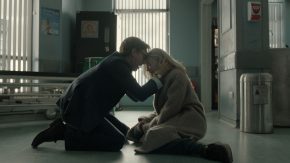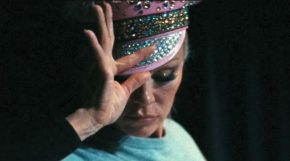Crackling fire, mulled wine, Satan
Based on a true story.
Despite the fact that I travel extensively, for this essay I chose to write about Hungary, my country of origin, and my favourite place in it and perhaps in the whole world; Dobogókő, a mountainous area not far from Budapest, my home town. It is one of the most beautiful places I know, so naturally it had to make it into my book. Or at least was, before they cut down half the forest after an extensive frost damage in the winter of 2014. The name ‘Dobogókő’ roughly translates as ‘top rock’, as it is the highest point of the Visegrád mountain range.
Wherever you set out from Northern Budapest, you’ll find yourself in a nature reserve or in some kind of forested, hilly area within twenty minutes, half an hour at the most; it is one of the many things I like about the city. Dobogókő is about an hour away with public transport from where I live in the city center.
One of my first memories is staying there with my granny at the holiday resort of the Socialist Party that she was a member of, not because she wanted to, but because she had to. I remember sliding down the rail of the staircase the way I saw in an advertisement on TV, and that’s where I learned to hate aspic and chestnut puree. We used to stay there later with my parents as well, during school holidays in the autumn and in the spring. They would read out The Lord of the Rings to me in the hotel room, and the fog strewn woods of Dobogókő and Middle Earth are forever linked in my mind. It’s like Rivendell, the Last Homely House. It is particularly foggy in the autumn and winter and it’s my favourite time to visit. Everything is possible when the fog descends. Dobogókő is also stunning in the spring; really, I’m hard pressed to choose my favourite season there. There was one pine grove in particular where my parents told me the elves lived among the branches. It was my favourite spot in Dobogókő, that pine grove. Not a trace of it is left, and a part of me died with it. Those trees were my friends…
After our daily hikes we would stop at the ski centre, or Makovecz house, as it is better known (after it’s architect, Imre Makovecz). The building looks like some kind of creature, a cross between a hedgehog and an owl, as it crouches there among the trees. Its speciality is bread spread with duck liver pâté with onion, sprinkled with ground red paprika that we would eat sitting on logs by the open hearth, accompanied maybe by a mug of mulled wine. If there ever was a perfect roadside inn or traveller’s rest straight out of a fantasy tale…
Dobogókő is believed to be one of Earth’s major energetic centres by people who believe in such things, where power lines converge and where all sorts of weird things are bound to happen. In their interpretation ‘Dobogókő’ means ‘throbbing stone’, as it’s supposed to be Earth’s heart chakra (and the word ‘dobogó’ does mean ‘top’ and ‘throbbing’). There is even a shamanic school and a drum circle, hosted by the Makovecz house, that tries to revive the pre-Christian Hungarian traditions that were sadly stamped out by our first Christian king, Stephen. You can sleep in yurts, the kind of tents nomadic Hungarians used on the Central Asian steppes, if that takes your fancy (it’s rather pricey, though). If nothing else, I hope the affection of all those cuckoos will help preserve Dobogókő and the forest, what little is left of it.
I want to talk about one particular event that ended our holidays there, as my parents refused to stay in that hotel ever after. It was Hotel Platán in case you were wondering; do stop there for a lunch if you’re ever around, their cuisine is top-notch.
As usual we were walking in the forest that day, when we got into a part of the woods we’ve never been to before. It was oddly desolate, bereft of animals or people; there was just the three of us among the silent trees, and a wobbly wire fence surrounding what we took to be an empty zoo of some sorts and a hut painted green. My dad tried knocking on the plywood covered window, but no reply came. There was no sound apart from the hollow thuds of his stick. The hairs on the back of my neck stood on end and I was wishing we would leave, yet it was all strangely exciting. There was a certain smell wafting in the air, that I soon learned was the reek of decomposition (side note: I hate the cliché expression ‘the sweet stench of decay’. Apart from being used and abused, it’s not sweet. If anything, it’s salty, spicy in a way that jars an atavistic part of you. Trust me, I’m talking from experience. I never understood where the idea of ‘sweet’ comes from.)
Luckily I haven’t smelled that stink often since, but whenever I did, I was immediately transported back into that oddly empty forest.
After a bit of loafing around, we strayed straight into Stephen King country. We chanced upon animal bones and skulls hung up on branches in an approximate circle; some of the shins were still half covered by mangy brown fur. In the middle of the circle there was a pile of guts and four strangled kittens. We left the scene of what my dad guessed was some kind of sick occult ritual in a hurry.
Shortly afterwards, perhaps on the same night, both my parents woke in the darkness of the hotel room, independently of each other. I slept through the night, so I only got an account of the event the following morning. Their recaps differ slightly, but then again it all happened more years ago than I care to count.
Mom remembers waking up, using the bathroom and laying back down. Dad then asked who was walking in the room. The minute she replied it was her I sat up in my bed and shouted No! four times, without waking up. In the morning dad said someone was walking in the room, as he heard the bathroom door opening and closing. Mom said it was her, but dad was convinced it wasn’t.
Dad woke to my screaming, then saw a dark human shape crossing the room. What they both agreed on was the oppressive feeling they were left with. They told me they’ve never been so afraid in their lives. My parents being the most rational, sceptic people I know, they produced a possible explanation: faulty refrigerators under our room generating infrasound, that messed with our systems. It’s suspected to be the culprit behind most ghostly encounters and, according to one theory, it is the explanation behind the mysterious events in the Bermuda Triangle.
In any case that was the last time we stayed in that hotel (although I went back a couple of years ago and nothing happened on any of the occasions I slept there). Once on a hike with an ex I saw a herd of roe deer darting through the twilight forest; then, at another occasion I climbed into an abandoned hotel with Sophiefox, one of my best friends. We crept around with the glass shards cracking under our shoes, but didn’t find anything interesting. Then again for Sophiefox and I an abandoned building by and in itself is interesting enough, that just begs for exploration.
——————–
It’s not just abandoned buildings that are begging me to explore them, inhabited buildings do the same. One of my favourite activities whenever I’m home is to sneak into houses (I just have to watch not to get caught by some busybody, but I have a cover story for such occasions: I’m looking for the yoga studio). For some reason I don’t really do this abroad (although I did do it with King’s College at the University of Aberdeen, crept up into the observation tower and into empty lecture rooms), I guess I respond differently to the vibes of the houses at home. I prefer a certain type of building, stately mansions built by magnates in the 19th, and at the turn of the 20th century; the last golden age of the Austro-Hungarian Empire, who either lived in them or rented them out.
The more derelict the house the more I love it, so I’m a little conflicted here as I don’t want them to fall apart or be torn down to have some modern monstrosity vomited in their place, a sad tendency in Budapest these days (I guess that’s partly why I feel like I need to immortalize them while I still can). So, I’m always happy to see them restored to their former glory, still… a shiny-sparkly newly renovated house has a different air than one where the layers of time and the presence and lives, the essence of its inhabitants settled like fine layers of dust in cobwebbed air shafts with their blistering, peeling plaster, distilled in the hazy sunbeam that lights up the crumbling hanging corridors.
It’s not just me sensing the magic in these soulful old buildings; there are guided tours, facebook pages dedicated to them, and once a year, for a few days dedicated to celebrating the history of the city and its houses, they open their gates to the public. But to me the real McCoy is sneaking into them when you’re not supposed to, of course. Spotting a door somebody left open a crack (not easy in this age of intercoms), or going in as somebody is coming out, or walking in after other people as if you were supposed to walk in after them, setting your phone camera to mute so the clicking sound won’t attract unnecessary attention and heading up to the top floor, then work your way down, trying to make as little noise as possible – the trick is to be quiet, but not in a conspicuous way, not looking like you’re creeping around, just acting as if you belong. It’s a good idea to use the elevator, if you’re lazy like me. Also, you are less conspicuous that way, and some of these elevators are fifty-sixty years old, historical wonders themselves, each of them unique: the last survivors of their quickly vanishing kind, with their sweet smell of wood polish and memories.
Once I’m on the top floor I usually head to the servants’ staircase, most of them scarcely used these days, left to gather dust and discarded household items, but they hide one important landmark: the attic door. If there is one thing I’m an even greater fan of than the houses themselves, it’s their attics and cellars. I absolutely adore attics and cellars. I feel like they are the secret heart, the subconscious of a building. Alas, most attic doors are locked, but on those rare occasions I come across an open one at the top of the guano encrusted stairs I snoop around on cat paws on the creaky plank walkway running around the entire length of the attic, admire the swirl of dust motes in the rays of light and listen to the coo of disturbed pigeons, to the secret sounds of the building. Under the walkway the attic floor is divided to sections by the massive timbers that support the roof, cluttered with scraps of life. Sometimes I find a window or just a hole among the roof tiles where I can get a view on the forest of roofs and antennae, or a glimpse of the city from an angle that only that particular house can offer.
Once I’m done in the attic, I set about exploring the storeys one after the other – all of them have something that makes them unique, that the other floors lack: a particular arrangement of flowerpots, a weird shaped hole under the rail where the walkway crumbled away, a warped door with its peeling paint. During these forays I like to imagine the lives and dramas that happened between these walls, from the grand magnate wives with their millstone hats and bustles and holidays at Abbazia, to star branded families huddling together behind the walls of the ghetto with what little possessions they were allowed to take, to police raids in the toughest years of the Rákosi era (Stalin’s best Hungarian pupil). Waves of politics, waves of art, classicism, art nouveau, art dèco, the roaring twenties, the hermetically sealed 60s and 70s of my parents’ youth, with whatever Beat era and hippie vibe they managed to extract in the face, and despite of the System.
Mangy cats, dusty old ladies peeking out nearsightedly from behind dirty nylon curtains, empty flats on the 5th floor used as storage rooms where only the dust bunnies are playing, the chronic alcoholic on the 2nd floor shouting at invisible people. Neighbours gathering on the corridors to exchange the latest house gossip, a bit like in the Mediterranean, a bit like a primeval community in the cave, which these mansions are an allegory of. We just lost our very own tattletale this summer, and the 4th floor just won’t be the same without her.
I work my way down storey by storey and once I reach the ground floor I risk exposure by looking around in the courtyard. There is so much hidden beauty if you know where to look. Some of them are bare or have laundry drying on wires, some of them pride themselves on sporting a lush garden. Some are cut off by a peeling firewall or a fence separating them from the courtyard of the next house, but all of them offer a completely different face of the house from below. If I’m lucky, I find an open cellar door, usually at the bottom of some obscure little flight of steps behind the elevator. I savour the musty smell as I wander around the narrow passages, breathing in the cool, damp air, peeking into storage units between rotting planks or wire fences, at piles of planks, brick, potato, forgotten bicycles, cats who never found their way out, broken glass, families cowering here during the air raids in ’44, hiding for weeks, found and eventually deported.
Travelling through space vertically, through time simultaneously, I arrive to the end of my house discovery tour (or just scat because someone is coming); I leave the building without touching or altering anything, as if I was never there.
****
Gypsy Romanticism/Notes on the Margins of a Dead Friendship
Once upon a time I had a friend from Eastern France, not far from the German border. We met on a Stephen King fansite, the since-defunct darktower.net. You know that feeling, like finding a long lost sister? She had a twin sister, but she would say I was more like her twin. I visited her in France multiple times, she visited me in Hungary multiple times, we travelled together to Belgrade, Slovakia and Vienna. We were together through thick and thin, through her breakup with her first great love, through her mother’s cancer, through my time in Israel, then the first half of my Iceland life. It was like being in love, really. I do think there is a fine line between true, deep friendship and romantic love.
Around the first time she came to Hungary the first cracks appeared in our friendship. We had a common friend (let’s just call her Chris), another Hungarian, my other best friend besides Sophiefox (I disclose their names with their consent). So Chris and I tried to present this friend from France (I refuse to say French friend, it almost sounds like french fries) a more nuanced image of the country and the history, the bad alongside the good, the homeless people, the unemployment rate, the existential insecurity alongside the tourist kitsch; she wouldn’t have it. She was interested in the tourist kitsch only, the Gypsy romanticism (a running joke with Chris and me ever since), as she would call it: an idealized image of the country she had in her mind that she refused to give up, and that was the first time I got the impression that she regards Hungary, and in fact any country she visits, as a playground, something that’s just there solely for her entertainment. I remember her reaction to an earthquake in Turkey in the early 2000’s. “Don’t worry”, she blithely reassured a common Turkish acquaintance, “I still want to visit Turkey” or words to that effect.
That was the second huge crack. I tried to point out to her why that comment and attitude was inappropriate – she just didn’t get it. In her view, I attacked her for absolutely no reason. Long story short, we kept in touch for approximately ten years, then, around halfway during my four years in Iceland I broke off relations with her. There came a point when I just couldn’t take it anymore (also I was having a bad time with anxiety and depression, which probably didn’t help). To this day she doesn’t understand why I ended it, why I cut her out of my life without a word of explanation. I was thinking of trying to explain, but I know it would be wasted effort. Not because she is stupid, but because she just can’t (and won’t) see past her mental barriers, beyond the privileged, coddled fantasy world she grew up in. I think that’s worse than deliberately being a jerk. I still feel somewhat bad for ghosting her the way I did, but I know that even if I contacted her and we started talking again, she’d say something in her second or third sentence that would make me want to tear my hair out.
I’m not saying that all Westerners are like that (thankfully), but she is a representative of a certain kind. You know the type. The one that goes to tribal dance with the tribesmen of Africa on a Safari, #authentic, #blessed, #lovelife, #nofilter.
She was the one who asked how it made me feel, being a Hungarian, reading Karl Marx’s Communist Manifesto. I mean, surely it must have evoked all kinds of strange, mysterious feelings what with me being a tribeswoman from the mystical, exciting, post-communist Eastern European jungle. I’m not sure what kind of strange, mysterious feelings were expected of me, the only emotion I can report is profound boredom.
All of the above highlight a host of differences between Westerners and Easterners, that I would like to explore in the last part of my essay.
I don’t remember much of growing up behind the Iron Curtain, but unfortunately I’m old enough to remember some of it. Distant as those years are, they still affect my present – not just mine, but the whole region’s – and my experience as a Hungarian and Eastern European living in Western Europe.
I remember only bits and pieces from before the change of the system – not being able to dress up in costume in the carnival season in February because we were a Party kindergarten, and the State found it important to show muscle in the face of a bunch of five year olds. More importantly I remember this intangible yearning for the West, the Promised Land, and how devastated I was when I couldn’t go with my parents to Vienna when they went there to get some financial transaction done that they couldn’t do from home (in those years of the soft dictatorship financial- and household appliances-tourism was the thing – Hungarians flocked to Austria to stock up on electric gadgets and to outsmart bureaucracy at home). To five-year-old me, Vienna felt like the other side of the globe. I came of age after the change of the system, when second hand western stuff and cheap remakes flooded the newborn market economy. The longing was there still as I was growing up, first for the U.S.A., then for Ireland, that feeling of ‘just get the hell out of here’. In the meanwhile I met and made friends with members of that blessed tribe, the Westerners. It was also the first time I experienced what it is like to be treated like a representative of some kind of exotic species: not quite human, similar to us but not quite, maybe a bird of paradise (I refrain from more degrading analogies), what it’s like when others visit your country like they visit the zoo or a theme park, knowing that after a short stint they can return to civilization. You wouldn’t think this is a thing in the middle of Europe, in this day and age (and I’m not claiming Hungarians are any better when visiting abroad, far from it). Of course we cash in on the Westerners visiting the post-Soviet bloc safari, as do all the slightly inferior peoples around the world. You have the Statue Park that hosts the mementoes of the communist era (I vaguely remember passing one of those amazingly hideous ‘works of art’, if you can call them that, on my way to and from kindergarten, but for the most part I’m as much a gaping tourist in there as the next person). You have the House of Terror, a museum dedicated to the fascist and communist regimes; you have thrift shops selling memorabilia, bits and bobs of lives past. As I said I met and made friends with Westerners (and Easterners and Northerners and Southerners), and with that came the first amusing, then, after the third time tiring compulsory rounds. Being asked to speak Hungarian is OK, if only slightly awkward, I mean I can relate, it’s a strange language, not related to anything in Europe (only Finnish maybe, not like you can tell). The hungry Hungarian joke wasn’t funny even for the first time and it seriously needs to go away. You won’t make any friends around here with the hungry Hungarian joke. It just makes me want to shudder, roll my eyes and punch you in the face simultaneously. A shout-out to every Austrian who was ever asked if they came from Australia and vice versa, and to every Turkish person who ever had to suffer the immortal, ineradicable Turkey-turkey joke. Whatever, I don’t want to sound like a snowflake, I accept it is part of the parcel.
Now that I made it, got the hell out of there, am a dweller of the Promised Land (even if I’ll never be a through and through Westerner) I find myself longing for Hungary, especially for Budapest with her lovely old, decrepit houses, cobwebbed light shafts, guano crusted attics.



























Comments
1 Responses to “Crackling fire, mulled wine, Satan ~ A short story by Susan Anwin”